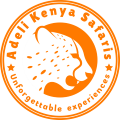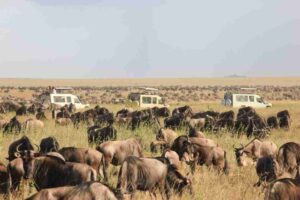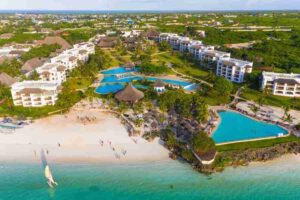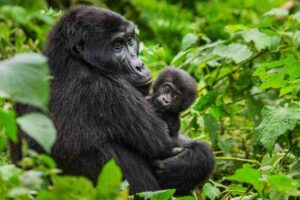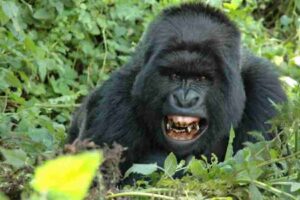| Name of the facility | Mara Toto |
|---|---|
| Certification Achieved | Silver |
| Year opened | 2013 |
| Tourism region | Masai Mara/South Rift |
| County | Narok |
| Address | Masai Mara National Reserve Map It |
| Telephone/Mobile | +254(0)202161437 |
| dws@africaonline.co.ke | |
| Website | greatplainsconservation.com |
| Facility Notes | Mara Toto Camp is located within the Masai Mara National Reserve specifically on Global Positioning System (GPS) coordinates, Latitude: S01021.132’ and Longitude: E 035009.771. The camp was established in 2013 owned and managed by the Great Plains Limited. It is a sister camp to neighboring Mara Plains and shares some of the operation components such as laundry. However, Mara Toto is a distinct product with a different value proposition. It is a seasonal camp open for approximately 9 months every year with five (5) guest tents and a total bed capacity of ten (10) visitors. The facility has a total work force of 16 permanent employees for its operations. The Maasai Mara National Reserve covers approximately 1,510 km2 under the management of Narok County Council (NCC) and Trans-Mara County Council. The Reserve is located in the northern portion of the Mara Serengeti eco-system, which covers 25,000 km2 straddling Tanzania and Kenya. Serengeti Park borders the Reserve to the south, Siria (or Oloololo) Escarpment in the west and community-owned conservancies to the North and East of the reserve. The Maasai Mara National Reserve has about 95 species of mammals and 570 species of birds recorded. It is famous for hosting the wildebeest migration, which is dubbed as the ‘8th Wonder of the World’. The migration occurs from the months of July to September. It involves wildebeests, Thomson’s gazelles, Topi, elands, and zebras. These migrants are followed along their annual, circular route by predators, most notably lions and hyenas. Numerous other antelopes can be found, including Thomson’s and Grant’s gazelles, impalas, duikers and Coke’s hartebeest. The Mara is also home to the “Big Five” (lion, leopard, African elephant, African buffalo, and Black Rhinoceros). The plains are also home to the distinctive Masai giraffe. |
| Energy management | Mara Toto Camp is powered by solar power fixed with an inverter system. In addition is a 16 KvA backup generator. Energy monitoring generator is carried out though fuel uptake recording. To save on consumption of electrical energy, Mara Toto camp has installed a centralized charging point; no sockets are installed in the guest rooms. Rechargeable solar torches are used for lighting. Energy saving bulbs and light emitting diodes are installed throughout the facility for power conservation. Main switches are easily accessible at the guest (fixed at the entrance) to conserve energy. Water heating is done through (2) two water efficient kuni boilers. Sustainably obtained fuel-wood (Eucalyptus) is used to run the boilers. Liquefied petroleum gas (LPG) is used for cooking at the guest and staff kitchens. Guests are briefed on energy conservation upon arrival and through information folders in the guest tents while staff is sensitized through staff meetings and departmental briefings |
| Environmental management | Mara Toto Camp has a comprehensive Environmental policy steered by the Great Plains motto ‘conserving and expanding natural habitats’. This is implemented through the facility policy which aims to create iconic role model conservation projects that ensure local communities benefit from protecting their environment and natural heritage. The camp has an environmental management system with monitoring action plans in resource use (water, and waste). The records are analyzed based on bed occupancy. The camp conducts an annual self-environmental audit as required by legislation. |
| Chemical use | Gas is bought in 50kg and 12kg cylinders. The camp uses biodegradable bathroom amenities in the guest tents. The chemicals are accompanied by Material Safety Data Sheet (MSDS) records. |
| Conservation Criteria | |
| Community Criteria | |
| Solid waste management | Waste separation (paper, plastics, metals glass and organic) is conducted at source and the bins are clearly labeled. The waste is later put in a waste collection center for further segregation before final disposal via Great Plains offices to recycling companies in Nairobi. Organic waste is composted within the facility. Compost pit is properly covered to keep off wildlife scavenging and rain water In waste reduction, the camp has adopted the following waste reduction measures; • Buys drinking water in 18 litre dispensers both to staff and guest. (as opposed to plastic bottles) • Water in the guest tents is served in glass jugs which are refilled from the dispensers. (a plastic waste reduction measure) • Solar rechargeable torches are used at the facility to reduce on cell battery |
| Water management | The main source of water for the camp is from a borehole located within the facility. The water is solar pumped and stored in high elevated reservoirs with a capacity of 10,000. It flows via gravity force to the entire premises. A float switch has been installed to avoid spillage. A water meter has been installed to monitor the water consumption. Additionally, the facility has two tanks with an average capacity of 6,400 litres for rain water harvesting. Water use recording for the rain water is done.
Guests are sensitized about water conservation on arrival, they are encouraged to re-use their towels through “towel-talks” and limited to using ‘safari showers’, 30 litres refillable buckets showers, as a means of conserving water. There is no running water at the guests’ tents; however the guest tents are fitted with water efficient dual cistern toilet system. |
| Visitor communication & education | Booklets and room information folders are available at the restaurant section and guest tents respectively. Publications such as Africa Geographic magazines, Books on Kenya, Masai Mara National Reserve and its ecosystem, Birds of Kenya, mammals and bird list are availed at the section. Room information sheets and flyers are strategically put at the guest tents for sensitization / communication purposes. Visitors are briefed upon arrival on the camp’s operations, and environmental values and the guest tents are equipped with room information folders to brief the visitors on environmental conservation activities and initiatives. Guests engage in activities which include; game drives, village visits, bird watching and nature walk safaris. Walking safaris are also aimed at reducing the carbon footprint of the facility |
| Pollution | The camp uses lanterns for lighting at night, around the facility as a measure to reduce on light pollution while the generator is sound proofed to reduce on the noise pollution. |
| Environmental conservation | Mara Toto Camp is built on low environmental footprint; it blends well with the local surroundings. The tents are semi-permanent made of brown canvas tents and erected on wooden platforms. Guest tents are raised on wooden platforms / pillars whereas the staff quarters are made from similar but ‘smaller’ canvas fly tents erected on the ground. The facility is unfenced which allows wildlife to wander freely. The natural vegetation is relatively undisturbed with pathways filled with dry grass to demarcate the way. Through Mara Plains (sister facility), Mara Toto has an environmental awareness creation and mentoring program for Endoinyo Erinka Primary School. In addition, the camp conducts various nature conservation initiatives within Olare Motorogi Conservancy. The camp supports and partners with wildlife conservation initiatives such as the Mara Lion Project– an initiative to build an identification database of lions in and around the conservancies north of the Masai Mara National Reserve through tracking individuals, effective conservation techniques and the Mara Cheetah Project – a research initiative to identify the behavioral adaptations and assessment of impact of social structure on reproductive success and survival of the cheetah in the protected areas. Support and partnership is implemented through creating awareness of the projects to clients and involvement of facility guides in reporting sightings |
| Waste water management | Grey water from the guest kitchen is managed through a grease trap to filter fats and oils before draining into a bio box treatment system. The grey and black effluent from the laundry, guest tents, public areas, and staff quarters is managed through Biobox treatment system. The System ensures the waste water is treated for recycling through treatment Water effluent tests are conducted is stipulated by law |
| Purchasing and supplies | Purchases for the facility are done centrally and bought in bulk to reduce on packaging while guest food is bought on demand. |
| Employment and remuneration/staff welfare | The camp has a staff welfare committee which handles and addresses employees’ issues. The committee represents staff issues to the management. |
| Staff education, communication and awareness training | There are notable notice boards within the facility where staff information/communication is done. The camp has weekly staff meeting for staff sensitization |
| Cultural preservation and promotion/protection of local sites | The camp has detailed room information folders with materials concerning the Masai Mara region and ecosystem, people and culture. Mara Toto further offers village visits for an authentic cultural experience at local Elndoinya Erinka Village. A community women group (consisting of 100 members) has been selected where visitors are taken at individual homesteads for cultural experience. Guests only purchase curios and beads at the women’s group shop. The visitors pay 10 USD to the women group kitty. |
| Benefits to local community/community empowerment | Mara Toto Camp purchases from the local Talek shopping centre including staff food, vegetables and fruits. About 80% of the permanent employees are from the local area however, all casual work is allocated to the locals. The employees were sought from the local community and trained on hospitality skills. The facility also makes annual remittances to the County Council of Narok. The camp has a community engagement plan in place, which is implemented through the mother company – Great Plains limited. Through Great Plains, Mara Toto is implementing the following initiatives: – Education: donation of learning materials, and construction of a classroom at Elndoinya Erinka School. Partnership with guests to establish the Erickson Scholarship program – started in 2012, the initiative aims to offer 50% bursary to top students joining secondary school. – Women Enterprise; the camp pays the salary of a female group coordinator / teacher who manages and offers trainings to the Elndoinya Erinka women group. Individually, the camp is a member of the “Pack for a Purpose” where visitors are encouraged to donate items needed by the communities. Donations made include learning materials – blackboards, stationery to local primary schools. |
| Cultural Criteria | |
| Health and safety | Mara Toto is linked to Flying Doctors service for emergency evacuations and a doctor on call for medical emergency. Also, there is a team of staffs and guides trained on first aid by Amref. Well-equipped first aid kits are available at the main office and game drive vehicles. The camp has undergone Health Inspection and issued with a Health Inspection Certificate while the food and beverage handlers have undergone medical check-up in compliance with Food, Drugs, and Chemical substances Act. Cap 254. Emergency contacts and documented procedures are strategically put at the manager’s office for safety preparedness at the camp. Guest tents are equipped with radio calls for emergency purposes Firefighting equipment such as fire extinguishers and fire blankets are strategically located and serviced. Sand buckets are also availed to boost firefighting equipment. In addition, an adequate team is well trained on fire safety. The camp provides PPE (Personal Protective Equipment) such as overall, gloves and boots to the repairs and maintenance staff. In addition, the facility has conducted a comprehensive health and safety audit and a Fire safety audit in compliance with Section 11 of Occupational Safety and Health Act 2007. |
| Child labor, abuse and human rights | The facility does not employ any person below the legal working age of 18 years. |
| Business Practises Criteria | |
| Entry Date | 13th March 2018 |
Mara Toto
Safe, Sustainable, Affordable & Unforgettable Africa safari experiences that Educate, Connect, Transform and Inspire.
Your dream safari in Kenya & East Africa is just a call or email away. Contact Adeli Kenya Safaris today. Tel: +254720564538 | WhatsApp: +254720564538 | Email: info@adelikenyasafaris.com
Share this:
Why Go with Adeli Kenya Safaris
- Born, raised & based in Africa. Let u show you the Africa we know well and cherish so much
- Africa sustainable travel is our passion
- Great Value for Money. Best price guaranteed
- Experienced team of travel experts
- Knowledgeable & multi-lingual safari guides
- Safety conscious
- Fleet of well maintained vehicles
Your dream safari / holiday is just a call or email away. Contact Adeli Kenya Safaris today. Tel: +254720564538 | WhatsApp: +254720564538 | Email: info@adelikenyasafaris.com
EXPLORE OUR FEATURED EAST AFRICA SAFARI HOLIDAY DESTINATIONS
FEATURED TOURS & HOLIDAY PACKAGES BY COUNTRY
Go Wander the wonderful world with Adeli Kenya Safaris

Africa Safari Tour Packages
Africa is more than just a destination—it is a feeling, an awakening, and a journey that touches the soul in ways words can hardly capture. Africa is a continent that stirs the soul, awakens curiosity, and leaves every traveler forever changed.
Europe Holiday Packages
SouthEast Asia Holiday Packages
Middle East Holiday Packages
Indian Subcontinent Holiday Packages
Central Asia Holiday Packages
Far East Holiday Packages
Australasia Holiday Packages
North America Holiday Packages
Central America Holiday Packages
South America Holiday Packages
Cruise Holiday Packages
Adeli Kenya Safaris, Kenya safari, African safari Kenya, Wildlife safari Kenya, Kenya wildlife tours, Kenya game drives, Safari holidays Kenya, Kenya safari tours 2025, Best Kenya safaris, Luxury Kenya safaris, Affordable Kenya safaris, Masai Mara safari, Amboseli safari, Tsavo National Park safari, Lake Nakuru safari, Walking safari Kenya, Hot air balloon safari Masai Mara, Birdwatching safari Kenya, Family safari Kenya, Photography safari Kenya, Cultural safari Kenya, Beach and safari Kenya, Private safari Kenya, Fly-in safari Kenya, Camping safari Kenya, Luxury tented camps Kenya, Best time to see the Great Migration in Masai Mara, Affordable family safari packages in Kenya, Luxury safari lodges in Kenya with private game drives, Walking safaris in Laikipia conservancy, Hot air balloon safari over Masai Mara at sunrise, Best birdwatching spots in Kenya during November, Family-friendly safari resorts near Nairobi, Photography tours in Amboseli with Kilimanjaro views, Cultural experiences with the Maasai tribe in Kenya, All-inclusive beach and safari packages in Kenya coast, Private guided safaris in the Chyulu Hills, Fly-in safari to remote areas of northern Kenya, Budget camping safaris in Tsavo East National Park, Luxury tented camps in the Mara Triangle for honeymooners, Best wildlife viewing in Kenya during the dry season (July-October), Ethical wildlife safaris in Kenya supporting conservation, Small group safari tours in Kenya for solo travelers, Wheelchair accessible safari options in Kenya, Kenya safari itineraries for first-time visitors, Best Kenya safari for seeing rhinos, Tanzania safari, African safari Tanzania, Wildlife safari Tanzania, Tanzania wildlife tours, Tanzania game drives, Safari holidays Tanzania, Tanzania safari tours 2025, Best Tanzania safaris, Luxury Tanzania safaris, Affordable Tanzania safaris, Serengeti safari, Ngorongoro Crater safari, Zanzibar safari, Tarangire safari, Lake Manyara safari, Ruaha National Park safari, Nyerere National Park (Selous) safari, Kilimanjaro safari (often combined with wildlife), Mahale Mountains chimpanzee trekking, Gombe Stream chimpanzee trekking, Best time to see the Great Migration in Serengeti, Luxury lodges in Ngorongoro Crater with wildlife viewing, Family safari packages in Tanzania with beach extension, Walking safaris in northern Tanzania, Hot air balloon rides over the Serengeti plains, Birdwatching tours in Lake Manyara National Park, Cultural tours in Tanzania combined with safari, Affordable camping safaris in Tanzania’s southern circuit, Photography workshops on Tanzania safaris, Honeymoon safari packages in Serengeti and Zanzibar, Wildlife safaris near Arusha for short trips, Chimpanzee trekking tours in western Tanzania, Best Tanzania safari for seeing the Big Five, Small group safari tours in Tanzania for solo travelers, Tanzania safari itineraries including Kilimanjaro trek, Ethical and sustainable safari options in Tanzania, Fly-in safaris to remote parks in Tanzania, Best time for wildlife photography in Tanzania, Tanzania safari deals and discounts, Serengeti Great Migration river crossing tours, best tour company in Kenya, best safari company in Kenya, best tour operator in Kenya, best travel company in kenya, best travel agency in kenya, best kenya safari company, nairobi safaris, nairobi kenya safaris, kenya safaris, safari in kenya, kenya wildlife safaris, kenya safari tour, kenya tours, Best responsible tours and travel agency in kenya, Best responsible tours and travel company in Tanzania, Best responsible tours and travel company in Zanzibar, Best responsible tours and travel company in Uganda, Best responsible tours and travel company in Rwanda, Best responsible tours and travel company in Botswana, Best responsible tours and travel company in Namibia, Best responsible tours and travel company in South Africa, Best responsible tours and travel company in Mauritius, Best responsible tours and travel company in Seychelles, Best responsible tours and travel company in Madagascar, Best responsible tours and travel company in Mozambique, Best responsible tours and travel company in Egypt, Best responsible tours and travel company in Israel, Best responsible tours and travel company in Thailand, Best responsible tours and travel company in East Africa, Best responsible tours and travel company in Eastern Africa, Best responsible tours and travel company in Africa, Best responsible tours and travel company in the world, Best responsible tours and travel company in Thailand, Best responsible tours and travel company in Malaysia, Best responsible tours and travel company in Croatia, Best responsible tours and travel company in Vietnam, Best responsible tours and travel company in Dubai, Best responsible tours and travel company in Singapore, Best responsible tours and travel company in Brazil, Best responsible tours and travel company in America, Best responsible tours and travel company in Canada, Best responsible tours and travel company in Europe, Best responsible tours and travel company in Greece, Best responsible tours and travel company in Turkey, Best responsible tours and travel company in Faroe Islands, Best responsible tours and travel company in Morocco, What is ecotourism, responsible travel, best green tourism company in kenya, best sustainale travel company in kenya, best ecotourism ompany in kenya, best sustainable travel practices, best things to to do in kenya, best things to to do in Nairobi, best things to to do in kenya, best things to to do in Mombasa, best things to to do in kenya, best things to to do in kenya, best things to to do in Nakuru, best things to to do in kenya, best things to to do in Naivasha, best things to to do in kenya, best things to to do in Maasai Mara, best things to to do in kenya, best things to to do in Kisumu, best things to to do in kenya, best things to to do in Amboseli, best things to to do in kenya, best things to to do in Tsavo West, best things to to do in kenya, best things to to do in Tsavo West, best things to to do in kenya, best things to to do in Samburu, best things to to do in kenya, best things to to do in Tanzania, best things to to do in kenya, best things to to do in Zanzibar, best things to to do in kenya, best things to to do in Uganda, best things to to do in kenya, best things to to do in Uganda, best things to to do in kenya, best things to to do in Rwanda, best things to to do in kenya, best things to to do in Mauritius, best things to to do in kenya, best things to to do in Seychelles, best things to to do in kenya, best things to to do in South Africa, best things to to do in kenya, best things to to do in Mozambique, best things to to do in kenya, best things to to do in Madagascar, best things to to do in kenya, best things to to do in Zambia, best things to to do in kenya, best things to to do in Israel, best things to to do in kenya, best things to to do in Dubai, best things to to do in kenya, best things to to do in Thailand, best things to to do in kenya, best things to to do in Greece, best things to to do in kenya, best things to to do in Santorini, best Tour Operator in Kenya, bestTour Operators in Nairobi, Tours in Kenya, Travel Agency in Nairobi, safari, kenya safari, kenya tours, tours and travel kenya, eco safaris, ecotourism, eco tourism, responsible travel, green tourism, agro tourism, east african safari air, kenya tanzania tours, africa tours, masaimara safari, tanzania safari, kenya travel, africa safari, nairobi safari, kenya safari tours, african safari, kenya safaris from nairobi, kenya wildlife safari, serengeti safari tour, safar tours & travels, best tour operators, luxury african safari tours, best african safari for seniors, african safari and beach package holidays, africa safari camp, kenya safari packages, kenya safari holidays, uganda safari packages, best places to go on safari in africa, best african safari itinerary, kenya wildlife safari packages, deal africa, travel operators, tour africa safaris kenya, luxury safari company, east african safari packages, safari travel companies, top safari tour operators, african safari travel agent, africa travel deals, trip safari, best safari experience, african safari photography, kenya holidays 2018, kenya safaris from nairobi, kenya safari, kenya holiday packages, kenya holidays, weekend getaways in nairobi, holiday destinations in kenya, weekend getaways in kenya, kenya safari holidays, tours and travel kenya, domestic holiday packages in kenya, kenya safari packages, tour operators in kenya, kenya destinations, kenya holidays 2017, kenya travel, kenya tours, tours and travel companies in kenya, kenya safari tours, safari kenya, kenya holidays 2018, kenya safari prices, holidays in kenya, travel agencies in kenya, dubai holiday packages from kenya, cheap holiday packages in kenya, cheap holiday destinations in kenya, getaways in kenya, kenya safari all inclusive packages, kenya all inclusive resorts, cheap january holiday deals, dubai holiday packages from dubai, vacation places in kenya, affordable holiday destinations in kenya, holiday getaways in kenya, trip kenya, kenya safari beach holidays, kenya safari vacation packages, travel package holidays, best travel package deals, trip to kenya safari, kenya’s best DMC, Kenya’s best tour operator ‘ Kenya’s best travel agency , Africa’s best DMC , Africa’ best tour operator , best kenya tour companies, luxury tour companies in kenya , why I love kenya , #whyilovekenya , join up safaris kenya , budget safaris in kenya , flying packages kenya , beach safaris in kenya , top rated tour companies in kenya , rooftent camping in kenya, safaribookings , tripadvisor, photography safaris in kenya , , best Tanzania safaris , kenya and Tanzania safaris , Tanzania road safaris , Tanzania flying packages, dubai packages , south Africa holiday packages, Seychelles holiday packages , Mauritius holiday packages , easter holiday packages , Christmas holiday packages , Wildebeest migration, kenya wildebeest migration, wildebeest migration kenya, wildebeest migration in Kenya, masaimara national reserve, travel kenya, traveling to kenya, travelling to kenya, kenya travel advisory, kenya travel advice, travel in kenya, travel agents in kenya, travelling in kenya, traveling in kenya, kenya travel agents, travel to kenya advice, travel advice to kenya, travel agents kenya, travel advisory to kenya, travel agency kenya, travel advisor kenya, travel alerts kenya, travel agencies kenya, kenya travel agencies, travel deals kenya, travel diaries kenya, kenya travel tips, tour operators in kenya, kenya tours and safaris, tours in kenya, tours and travel kenya, tours kenya, tours of kenya, kenya tour companies, tours and travel in kenya, tour to kenya, kenya tours and travel companies, kenya wildlife tours, tours and travels in kenya, trip to kenya, trips to kenya, kenya trip, kenya trips, trip to kenya Africa, trip advisor kenya, kenya trip advisor, visit kenya, visiting kenya, kenya visit, where to visit in kenya, why do people visit kenya, kenya tourism, tourism in kenya, tourism kenya, tourism of kenya, kenya and tourism, kenya safaris, safaris in kenya, safaris kenya, kenya lodge safaris, african safaris kenya lodge safaris kenya, safaris to kenya, kenya camping safaris, kenya african safaris, camping safaris kenya, kenya tourist attraction, tourists in kenya, tourist attraction in kenya tourist spots in kenya, kenya tourists, kenya tourist spots, why do tourists visit kenya, kenya holiday, holidays in kenya, holidays to kenya, kenya holidays, holiday in kenya, holidays kenya, holiday to kenya, holiday kenya, kenya travel guide, travel guide kenya, kenya guide, travel guide to kenya, kenya information guide, kenya tour packages, kenya holiday packages, kenya vacation packages, kenya packages, holiday packages in kenya, kenya travel packages, holiday packages kenya, kenya package, kenya holiday package, kenya tour package, kenya package holidays, travel packages kenya, kenya safaris packages, places to visit in kenya, kenya places to visit, best places to visit in kenya, tourist places in kenya, places to see in kenya, kenya tourist places, places in kenya to visit, places to visit kenya, go kenya tours, go kenya, places to go in kenya, go to kenya, where to go in kenya, going to kenya, why do people go to kenya, why go to kenya, information on kenya, kenya information, kenya travel information, information kenya, information of kenya, holiday destinations in kenya, kenya destinations, tourist destinations in kenya, kenya holiday destinations, kenya tourist destinations, best holiday destinations in kenya, kenya as a tourist destination, holiday destinations kenya, blogs in kenya, travel blog kenya, kenya blogs, blogs travel to kenya, safaris in kenya, kenya safaris, safaris kenya, safaris to kenya, car hire Nairobi, car hire in Nairobi, nairobi car hire, car hire services in Nairobi, car hire kenya Nairobi, car hire companies in Nairobi, car hire nairobi kenya, cars for hire in Nairobi, car hire in kenya Nairobi, car hire services Nairobi, cheap car hire Nairobi, nairobi car hire services, car hire in nairobi kenya, car hire companies in nairobi kenya, car for hire in Nairobi, car hire companies Nairobi, 4wd car hire Nairobi, cheap car hire in Nairobi, car hires in Nairobi, nairobi airport car hire, 4×4 car hire Nairobi, car hire market, cars for hire nairobi , car hire Mombasa, car for hire Nairobi, car hire uganda , 4×4 hire Nairobi, car hire Tanzania, 4×4 car hire dar es salaam, 4×4 car hire Tanzania, car hire kenya, 4×4 car hire kenya, car hire in kenya , kenya car hire, 4×4 car hire Uganda, 4×4 car hire Arusha, kenya tours and safaris, tours in kenya, tours and travels in kenya, tours kenya, tours of kenya, tours to kenya, go kenya tours, tour to kenya , car hire companies in kenya , 4wd car hire kenya, go kenya tours and safaris, kenya wildlife tours, car hire services in kenya, terminal tours kenya, kenya tanzania tours, tours and travel in kenya , kenya budget tours , tours and travel jobs in kenya, tours and safaris in kenya , kenya adventure tours, tours kenya Tanzania, tour operators, tanzania tour operators, tours and travel kenya, tour operators in Tanzania, top tour operators, african tour operators, tour firms in kenya , car hire kenya rates , car hire in kenya prices, kenya car hire services, mombasa tour operators, cars for hire in kenya, car hire kenya prices, kenya safaris, car hire business in kenya, tour kenya, kenya wildlife safaris, safaris to kenya, kenya camping safaris, wildlife safaris kenya, african safaris kenya, kenya budget safaris, safaris kenya, kenya tanzania safaris, kenya african safaris, tour companies in kenya, kenya car hire companies, car hire services kenya, cheap car hire in kenya, tours and travel companies in kenya, tour and travel companies in kenya, kenya tour companies, executive car hire kenya, tour companies kenya, wildlife kenya safaris, safaris in kenya, travel companies in kenya , tourism companies in kenya, kenya tours and travel companies, tours and safaris companies in kenya, companies in kenya, list of companies dealing with travel tours in kenya, kenya tour, tours companies in kenya, list of tour companies in kenya, best companies in kenya, kenya companies, 4×4 camping, 4×4 holidays, camping 4×4, 4×4 excursion, kenya tours,kenya best hotels,best hotels in kenya,kenyahotels,honeymoon destinations in kenya, 4×4 kenya, Rooftemt camping in kenya, rooftent hire in kenya, Nairobi safari tours, mombasa safari tours, amboseli safari tours, nakuru safari tours, naivasha safari tours, lake bogoria safari tours, lake baringo safari tours, maasai mara safari tours, tsavo east safari tours, tsavo west safari tours, samburu safari tours, ol pejeta conservancy safari tours, aberdare national park safari tours.
